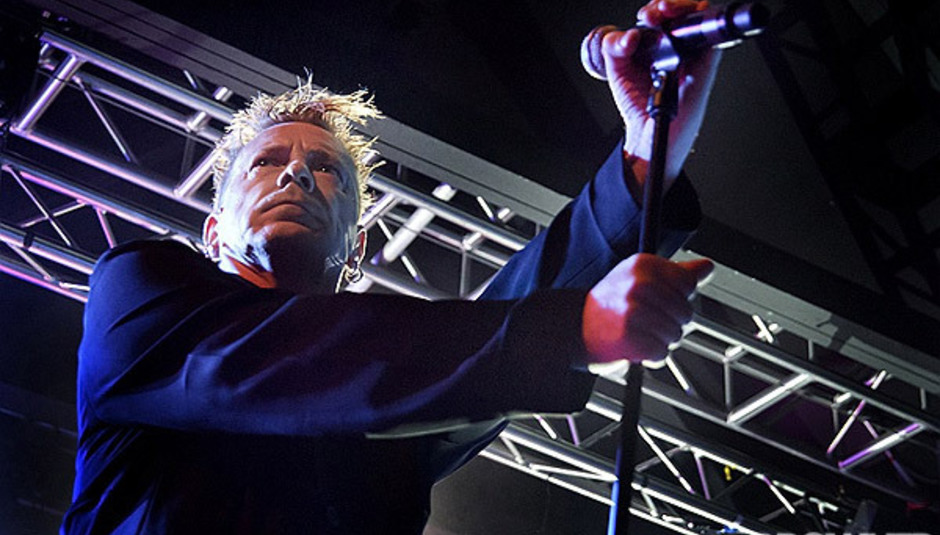In his first public address on 26 November 1976, in the opening seconds of the Sex Pistols' debut single, Johnny Rotten declared himself "an antichrist". Two years later, John Lydon reintroduced himself to the record-buying public by saying "Hello" on 'Public Image', PiL's debut single. Here, Lydon was starting a new conversation about who he really was: "You never listened to a word that I said / You only seen me for the clothes that I wear", he spat, brilliantly reasserting control over his own public image. This was Lydon ditching the antichrist persona, bringing an end to anarchy in the UK and saying, loudly and clearly, "This is who I really am". The thing is, that was 35 years ago, and unless you're the man himself, the issue of who the real John Lydon is remains up for debate.
This much we do know: John Lydon fronted the Sex Pistols as Johnny Rotten from 1975 to 1978, becoming one of the most influential and iconic figures of the 20th century and, at the same time, the most hated man in Britain. He formed PiL with Keith Levene and Jah Wobble in the aftermath of the Pistols' last gig and the band made a string of ground-breaking albums (how many, depends on who you ask) before a hiatus in 1993.
What followed was an autobiography (Rotten: No Irish, No Blacks, No Dogs), a solo album (1997's Psycho's Path) and a series of strange flirtations with fame: a show on VH1 (Rotten TV), I'm A Celebrity..., several turns hosting nature documentaries and, of course, the butter ads. Finally, after a surprise Sex Pistols reunion in 2007, he took PiL back on the road in 2009 and released their first album in two decades, This Is PiL, just over a year ago.
It's these last two decades that really confuse Lydon's fans and critics, who see a man whose relationship with celebrity has gone from one extreme to another. After PiL, he spent years keeping himself to himself, then suddenly, here he was, appearing in reality TV shows and adverts. So, does he like being the public eye?
"No, I don't like any of that. I mean, check out the name, Public Image Limited. I come from the Pistols, the world's most notorious band. We didn't ask for that nonsense. That was just there. In fact, the paparazzi began around us and we watched them slowly develop into that full-on nausea they are today. So no, daddy don't like some of his children."
Now, when you train as a journalist, you get taught that a great interview isn't an interview - it's a conversation. John Lydon, however, is not a man that you can have a conversation with (not if you're a journalist, at least). That's not to say that he isn't warm, open, engaging and very funny ("I've been offering these gossip mags a picture of my willy for years. They are not interested!"), but he does the talking. He'll start talking before you've finished asking your question, and getting him to let you finish it can be extremely hard work.
He first exhibits this trait when he thinks he's being criticised for those butter adverts he starred in in 2008. Subsequently he employs it to protect himself from being pressed on his most apparent contradiction - that of being someone who says he hates being in the public eye, but who is never far away from it. "Oh my God! Somebody's got to pay me!" he blasts, when those headline-grabbing adverts come up. He then slams the suggestion that they might have shocked people, refusing to hear any explanation as to why the ultimate anti-celebrity appearing in a television commercial might have caught the public by surprise:
"How? How? Aren't working class people allowed to make money any more?"
DiS: It just seemed slightly at odds with...
"No, no, wait. Is that 'thank you socialism', you know? Fuck that, Tony Blair world."
DiS: You can see how people would see it as slightly at odds...
"No, I can't. I can see how people are misled and I can't understand why they're misled. Stop feeling downtrodden and don't let the system kick you up the arse all the time. I'm here to destroy them rules and principles. They're the enemy. I love a bit of butter on me butty!"
DiS: I personally don't have a problem with it...
"Well, it's not your decision to judge me. You've no right. None at all. I've demanded more money for charity than I know, than any of them other so-called hypocrites. You know, I got slagged off for doing the I'm A Celebrity... thing - £270,000 for charity. And you know, I don't ask for that to be bombasted over the press, because I'm not looking for a medal. That's the truth of it, and of course I'm accused for that of being a sell-out. When I started PiL I was accused of being a sell-out because it wasn't the Pistols anymore. It's a ludicrious philosophy and it's all really led by a resentful, jealous view."
DiS: Do you try and combat it in any way, because I know you're...?
"No. I can't be bothered with it. I just tell you when you ask. It's as simple as that. I'm not going to run out and have a manifesto to protect myself from the ill will of others. Frankly, I'm quite glad they're talking about me."
DiS: Well that goes back to what I was asking you about before...
And already he's answering down the other end of the phone, but the key question is being formed, if he'll let it come out.
DiS: You say you don't like being in the public eye...
"No, no! You're talking over me. We'll never get anywhere if we go on like this."
And he's right. We're not getting anywhere, so we move on.
Listening back to the recording, its easy to wonder whether with a little more time, a few more nudges in the right direction, Lydon might given a clearer answer. But from this end of the phone line, all that could be heard was a man fighting for his reputation before it's even been called into question. It's almost like a defence mechanism; there's a hint of paranoia and, in fairness, it makes perfect sense when you think of Lydon, not as he is today, but as 21-year-old Johnny Rotten, having his every action vilified as he's forced against his will into the concrete shoes of Public Enemy No. 1. John Lydon's had no choice but to defend himself since 1977, and old habits die hard.
Later though, the subject of his celebrity status (reluctant or otherwise) comes up again. He lets out a cackle when he's told that, try as he might, he's still very famous. "I've been infamous and famous! There's an achievement! I'm the yin and yang, I'm like a Zen Buddhist!" he laughs, adding that fame is not something he takes seriously. So why do the TV shows, the interviews and, indeed, the butter adverts? He comes closest to answering when he's asked to choose which he'd prefer: fame or influence?
"I don't know about famous. It seems to bring people nothing but grief. I'm definitely influential. That can't be denied. That's a historical fact, and in so many different ways. I've been there on the cutting edge of many things."
DiS: I'm not going to disagree with you on that, but do you think that sounds arrogant?
"Yes, to some it might be but it's an actual fact. I can help it and I did. I was there at the beginning of hip-hop. I made Time Zone with Bambaata. I created PiL. That's, I originated that band. I'm the one what wrote them lyrics in the Pistols. You can't take that away, and don't expect me to forget it either."
And therein lies the paradox. John Lydon is unashamedly proud of the music he has made, and eager, it would seem, to be recognised for the influence it has had. But you can't be influential if no one knows who you are. If you want to be remembered, you have to make it so that you can't be ignored: you have to play the celebrity game. So you do the chat shows, the interviews, and you take the money for the butter ads, if only so that you can go on making new music and breaking new ground.
You only have to ask Lydon about his recent public controversies to realise that he wasn't designed for public scrutiny: he doesn't like it. Sure, he laughs about the drummer who took him to Judge Judy over a contract dispute and an alleged assault ("What a silly areshole accusation! If there was any truth in the accusation, look out judo world, Rotten's on the rampage!") but his tone softens as he goes on:
"Unfortunately he created a situation of er, well, many people out there thought they could achieve similar results. Going for scandle-mongering press and creating false accusations became the order of the day, and for a long time I tried to deliberately shy away from anything to do with being in public at all, and that made life very, very difficult."
The one that appears to have hit him hardest was in 2008, when an alleged backstage altercation with Bloc Party's Kele Okereke led to accusations that Lydon was a racist. "That really upset my grandkids," he explains, without mentioning that they were raised in Jamaica by his stepdaughter, The Slits' singer Ariane "Ari Up" Forster. He goes on:
"That absolutely tore into them. They were in tears and furious about it. And then again, someone comes up with that accusation and they haven't done their research. They don't know my background or my family life and it's a terrible accusation to have to deal with because you've got no way of answering it. You're between a rock and a hard place and it's quite crushing, the damage that it does emotionally, because it's such a lie. It hurt me, it hurt my community. I come from a very mixed background, Finsbury Park, we're a mixed mob down there, and it's, 'How can you let them say that about you?' Well, how can you stop them?"
By now you've probably also seen the Australian TV footage, where an exchange of words with between Lydon and a female broadcaster leads one of her colleagues to label him a "flat out, sexist, misogynist pig". Clearly, Lydon lost his cool when he said, "When a man is talking, do not interrupt," but to call him a sexist is to put the words "...because I am a man and you are a woman," into his mouth. He'd have said the same thing to anyone who interrupted him - he came close to saying the same thing to me, after all.
"Oh anybody, but I didn't finish the sentence and right now, I can't remember what the full sentence would have been in response," he says. There's another line of defence he agrees with too: that if Johnny Rotten - one of the most outspoken, controversial figures in the history of popular culture - was a sexist, we probably would have noticed long before now. "Oh, I reckon, don't you? I think the missus would've," he jokes.
DiS: And your stepdaughter was in The Slits, she was a feminist icon!
"Yeah that's right. Yep."
Suddenly, John Lydon's no longer doing the talking. He will speak about many things, but his late stepdaughter is not one of them. As the conversation is steered away - as the guilt of a clumsy hack chokes up my oesophagus - the dawning realisation is an obvious one.
John Lydon may be Johnny Rotten; he may be controversial; he may be confrontational; he may be paradoxical in his fight for privacy versus his quest for recognition. But he is also a human being who, like any parent who has lost a child, will never stop grieving. He is a man who has had a very strange, often very difficult life, who has had an awful lot of shit to deal with in his 56 years. But John Lydon is just a man, and the rest isn't really up to you.
Stay tuned for DiS meets John Lydon - Part 2: The Music.
Public Image Ltd. will play the following UK dates:
June 9th - Oxford, o2 Academy
June 10th - Leicester, o2 Academy
June 27th - Brighton, Dome
June 28th - Manchester, Ritz






















